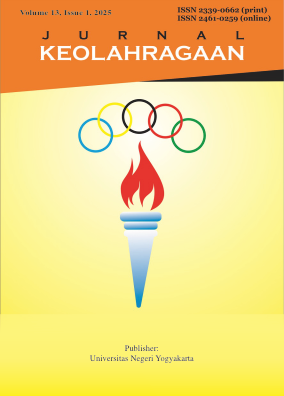Mapping the environments, motivation and sport through bibliometric analysis from 2004 to 2024
DOI:
https://doi.org/10.21831/jk.v13i1.72910Keywords:
Bibliometric Analysis, VOSViewer, Motivation, Environment, SportsAbstract
In order to create a better environment for sporst activities, abibliometric research exploring the relationship between environment, motivation, and sport globally. This study investigates the significant increase in scientific publications on the topic from 2004 to 2023, with a noted decline in 2024. This research using VOSviewer to anlalyse the tren and relationship refer to the scientific publication of the environment, motivation and sports topics. The International Journal of Environmental Research and Public Health emerged as a major contributor, accounting for 35 articles published. Significant patterns of author collaboration were uncovered, with an average of 2.67 authors per article, highlighting a concentration among a select group of top authors. Dominant research themes such as “Motivation,” “Sports,” “Health,” and “Education” were identified through the keyword co-occurrence network, indicating robust interrelationships. Analysis of co-author relationships between countries underscores the pivotal contributions of nations including the United States, United Kingdom, China, Germany, and France, underscoring the importance of cross-country collaboration in research advancement. This research offers insights into the evolving landscape of environmental and motivational factors in sport, providing a comprehensive overview of international trends, collaborations, and research foci. These findings serve to guide future research endeavors and inform decisions pertaining to global initiatives promoting healthy and motivated environment for sports activities, grounded in scientific evidence.
References
Antonio, J., Murcia, M., & Cervelló, E. (2007). Perception of discipline according to gender, type of school, sport activity and interest in physical education in Spanish students. [Preprint]. https://www.researchgate.net/publication/255608789
Baillot, A., Chenail, S., Polita, N. B., Simoneau, M., Libourel, M., Nazon, E., Riesco, E., Bond, D. S., & Romain, A. J. (2021). Physical activity motives, barriers, and preferences in people with obesity: A systematic review. PLOS ONE, 16(6), e0253114. https://doi.org/10.1371/journal.pone.0253114
Bull, F. C., Al-Ansari, S. S., Biddle, S., Borodulin, K., Buman, M. P., Cardon, G., Carty, C., Chaput, J. P., Chastin, S., Chou, R., Dempsey, P. C., Dipietro, L., Ekelund, U., Firth, J., Friedenreich, C. M., Garcia, L., Gichu, M., Jago, R., Katzmarzyk, P. T., … Willumsen, J. F. (2020). World Health Organization 2020 guidelines on physical activity and sedentary behaviour. British Journal of Sports Medicine, 54(24), 1451–1462. https://doi.org/10.1136/bjsports-2020-102955
Carter-Thuillier, B., López-Pastor, V., Gallardo-Fuentes, F., Carter-Beltran, J., Fernández-Balboa, J. M., Delgado-Floody, P., Grimminger-Seidensticker, E., & Sortwell, A. (2023). After-school sports programmes and social inclusion processes in culturally diverse contexts: Results of an international multicase study. Frontiers in Psychology, 14, 1122362. https://doi.org/10.3389/fpsyg.2023.1122362
De Man, J., Kasujja, F. X., Delobelle, P., Annerstedt, K. S., Alvesson, H. M., Absetz, P., Wouters, E., Daivadanam, M., Guwatudde, D., Puoane, T., Remmen, R., Tabana, H., & Van Olmen, J. (2022). Motivational determinants of physical activity in disadvantaged populations with (pre)diabetes: A cross-cultural comparison. BMC Public Health, 22(1), 12539. https://doi.org/10.1186/s12889-022-12539-9
Edison, B. R., Christino, M. A., & Rizzone, K. H. (2021). Athletic identity in youth athletes: A systematic review of the literature. International Journal of Environmental Research and Public Health, 18(14), 7331. https://doi.org/10.3390/ijerph18147331
Edmunds, J., Ntoumanis, N., & Duda, J. L. (2006). A test of self-determination theory in the exercise domain. Journal of Applied Social Psychology, 36(9), 2240–2265. https://doi.org/10.1111/j.0021-9029.2006.00102.x
Fairclough, S. J., Hilland, T. A., Vinson, D., & Stratton, G. (2012). The physical education and school sport environment inventory: Preliminary validation and reliability. Environment and Behavior, 44(1), 50–67. https://doi.org/10.1177/0013916510388495
Fathi, B., Nadrian, H., Hashemiparast, M., Nikookheslat, S., Esmaeilzadeh, S., & Khodayari-Zarnaq, R. (2021). “I feel too lethargic to do physical activity”: Perceptions of Iranian adults on the barriers to perform regular physical activity. Health Promotion Perspectives, 11(4), 476–484. https://doi.org/10.34172/hpp.2021.60
Granero-Jiménez, J., López-Rodríguez, M. M., Dobarrio-Sanz, I., & Cortés-Rodríguez, A. E. (2022). Influence of physical exercise on psychological well-being of young adults: A quantitative study. International Journal of Environmental Research and Public Health, 19(7), 4282. https://doi.org/10.3390/ijerph19074282
Kerr, Z. Y., Roos, K. G., Schmidt, J. D., & Marshall, S. W. (2013). Prevention and management of physical and social environment risk factors for sports-related injuries. American Journal of Lifestyle Medicine, 7(2), 138–153. https://doi.org/10.1177/1559827612450683
Ondric, M., & Furjan-Mandić, G. (2013). Participation motivation and student’s physical activity among sport students in three countries. Journal of Sports Science and Medicine, 12(1), 10–18. http://www.jssm.org
Lee, S., Kwon, S., Kim, Y. S., & Lee, D. (2021). The effect of adolescent athletes’ achievement goal orientation and perception of error on their sport-confidence. International Journal of Sports Science & Coaching, 16(3), 646–657. https://doi.org/10.1177/1747954120976248
Liu, B., Zhou, C. J., Ma, H. W., & Gong, B. (2023). Mapping the youth soccer: A bibliometrix analysis using R-tool. Digital Health, 9, 20552076231183550. https://doi.org/10.1177/20552076231183550
Merma-Molina, G., Urrea-Solano, M., González-Víllora, S., & Baena-Morales, S. (2023). Future physical education teachers’ perceptions of sustainability. Teaching and Teacher Education, 132, 104254. https://doi.org/10.1016/j.tate.2023.104254
Milton, K., Bauman, A. E., Faulkner, G., Hastings, G., Bellew, W., Williamson, C., & Kelly, P. (2020). Maximising the impact of global and national physical activity guidelines: The critical role of communication strategies. British Journal of Sports Medicine, 54(24), 1463–1467. https://doi.org/10.1136/bjsports-2020-102324
Milton, K., Varela, A. R., Strain, T., Cavill, N., Foster, C., & Mutrie, N. (2018). A review of global surveillance on the muscle strengthening and balance elements of physical activity recommendations. Journal of Frailty, Sarcopenia and Falls, 3(2), 114–124. https://doi.org/10.22540/jfsf-03-114
Moreno, J. A., González-Cutre, D., Martín-Albo, J., & Cervelló, E. (2010). Motivation and performance in physical education: An experimental test. Journal of Sports Science and Medicine, 9(1), 79–87. http://www.jssm.org
Mouratidis, A., Vansteenkiste, M., Lens, W., & Sideridis, G. (2008). The motivating role of positive feedback in sport and physical education: Evidence for a motivational model. Journal of Sport and Exercise Psychology, 30(2), 240–258. https://doi.org/10.1123/jsep.30.2.240
Muniandy, M., Mohd Rasyid, N., Abdul Razak, N., & Elumalai, G. (2023). Bibliometric analysis: Psychology in sport. International Journal of Academic Research in Progressive Education and Development, 12(2), 616–626. https://doi.org/10.6007/ijarped/v12-i2/16948
Murillo, R., Vazquez, M., Leal, I. M., Hernandez, D. C., Lu, Q., & Reitzel, L. R. (2021). Perceptions and barriers to physical activity in childhood and adulthood among Latinas. Health Behavior and Policy Review, 8(4), 294–304. https://doi.org/10.14485/HBPR.8.4.2
Pike, E. C. J., Jackson, S. J., & Wenner, L. A. (2015). Assessing the sociology of sport: On the trajectory, challenges, and future of the field. International Review for the Sociology of Sport, 50(4–5), 357–362. https://doi.org/10.1177/1012690215574127
Reinboth, M., & Duda, J. L. (2006). Perceived motivational climate, need satisfaction and indices of well-being in team sports: A longitudinal perspective. Psychology of Sport and Exercise, 7(3), 269–286. https://doi.org/10.1016/j.psychsport.2005.06.002
Reinboth, M., Duda, J. L., & Ntoumanis, N. (2004). Dimensions of coaching behavior, need satisfaction, and the psychological and physical welfare of young athletes. Motivation and Emotion, 28(3), 297–313. https://doi.org/10.1023/B:MOEM.0000040156.81924.b8
Safitri, R., Marcellina, S., & Abidin, Z. (2023). An overview of young athlete needs and perceptions on sports psychology services. Jurnal Pendidikan Jasmani dan Olahraga, 8(1), 42–48. https://doi.org/10.17509/jpjo.v8i1.53666
Sheng, Y., Huiting, Z., Qiang, Z., & Chenhui, L. (2024). A corpus-based bibliometric study of highly cited papers in sport sciences. SAGE Open, 14(1), 21582440231225856. https://doi.org/10.1177/21582440231225856
Standage, M., Duda, J. L., & Ntoumanis, N. (2005). A test of self-determination theory in school physical education. British Journal of Educational Psychology, 75(3), 411–433. https://doi.org/10.1348/000709904X22359
Strain, T., Milton, K., Dall, P., Standage, M., & Mutrie, N. (2020). How are we measuring physical activity and sedentary behaviour in the four home nations of the UK? A narrative review of current surveillance measures and future directions. British Journal of Sports Medicine, 54(21), 1269–1276. https://doi.org/10.1136/bjsports-2018-100355
Tao, K., Liu, W., Xiong, S., Ken, L., Zeng, N., Peng, Q., Yan, X., Wang, J., Wu, Y., Lei, M., Li, X., & Gao, Z. (2019). Associations between self-determined motivation, accelerometer-determined physical activity, and quality of life in Chinese college students. International Journal of Environmental Research and Public Health, 16(16), 2941. https://doi.org/10.3390/ijerph16162941
Wang, Q., Zainal Abidin, N. E., Aman, M. S., Wang, N., Ma, L., & Liu, P. (2024). Cultural moderation in sports impact: Exploring sports-induced effects on educational progress, cognitive focus, and social development in Chinese higher education. BMC Psychology, 12(1), 1584. https://doi.org/10.1186/s40359-024-01584-1
Wu, M., Long, R., Bai, Y., & Chen, H. (2021). Knowledge mapping analysis of international research on environmental communication using bibliometrics. Journal of Environmental Management, 298, 113475. https://doi.org/10.1016/j.jenvman.2021.113475
Wu, Q., Tan, Y., Sun, G., & Ding, Q. (2023). The relationship between self-concept clarity, athletic identity, athlete engagement and the mediating roles of quality of life and smartphone use in Chinese youth athletes. Heliyon, 9(10), e21197. https://doi.org/10.1016/j.heliyon.2023.e21197
Downloads
Published
How to Cite
Issue
Section
License
Copyright (c) 2025 Ayodya Satryo Anggorojati

This work is licensed under a Creative Commons Attribution-ShareAlike 4.0 International License.
Jurnal Keolahragaan by http://journal.uny.ac.id/index.php/jolahraga/index is licensed under a Creative Commons Attribution-ShareAlike 4.0 International License.










